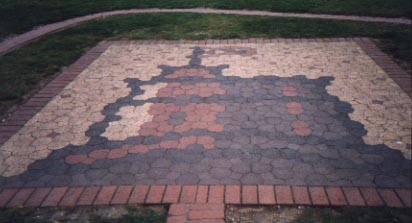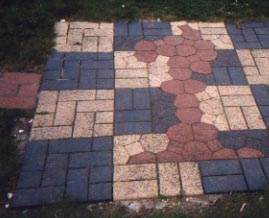The Royal Windsor Maze, Goswell's Park, Windsor.
| This maze, made in 1999 and seen here with Windsor Castle in the background, uses a special tiling system. The paths through the grass are brick, but on the way to the centre there are pictures of chess pieces. These are made up of seven-sided pavers invented by the designer of the maze, Adrian Fisher. With halved versions of the main shape (these have five sides) and small squares, the system tessellates (fits together without gaps) in many different ways. This allows images and decorative patterns to be made without cutting the pavers. |  |
Different colours pick out the patterns, and paving plans can be generated by computer to fit the chosen design. The piece at the centre of the maze is the rook, or castle, which is in the shape of the Round Tower of Windsor Castle. Also shown here is the knight (below right).
 |
 |
As in chess, there are choices to be made on the way. It is
a "forwards only" design - you can't double back at
a junction, but can only take paths which fork in the direction
you are going at that time. Adrian Fisher explains: "The
maze should be played as if you are a runaway train - always moving
smoothly through the points forwards, and never able to reverse.
This maze-movement idea was inspired by the nearby Windsor Railway
Station, which brought the Royal Family to Windsor from Victorian
times onwards. The maze paths sometimes run together in pairs,
like a pair of railway tracks; sometimes they even run through
"railway cuttings", where the grass surface rises and
falls around them.
"The Game of Chess is a kind of maze - you cannot immediately
tell how close you are at winning, until you appreciate the moves
that lead up to the present position, and indeed the signficance
of the various options open to you at this moment. With the "Rook"
as Windsor Castle portrayed as the goal of this maze, the other
Chess pieces add spice and detail to your maze journey."
back to list (mosaics in the south of England)
the joy of shards Mosaics Resource